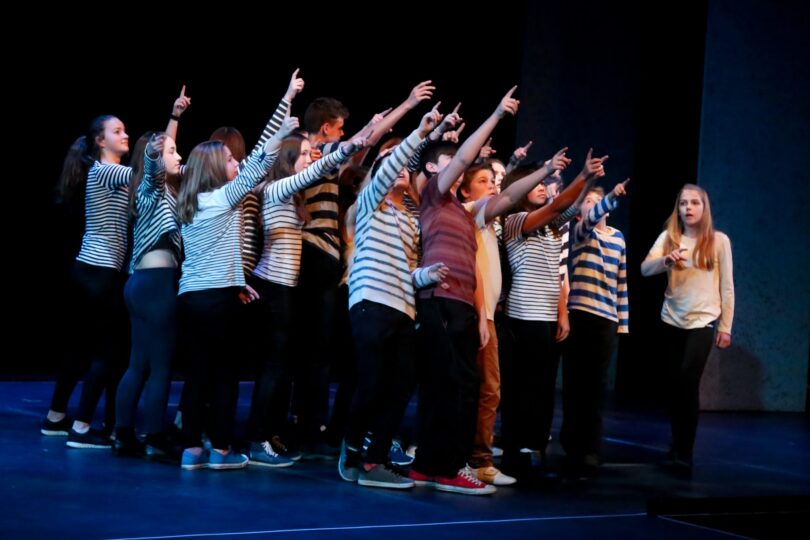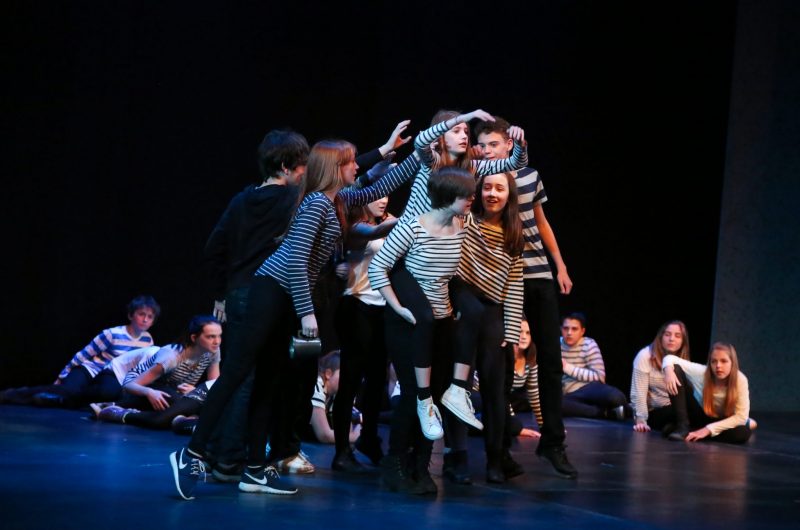
We want students to have the chance to tell a story that is important to them. To feel that theatre gives them the opportunity to say something they care about.
In October we’ll be seeing how students have risen to the latest challenge the Mercury Theatre has set them – to devise new performances based around the inspirational poem Still I Rise by African American poet Maya Angelou.
I absolutely love seeing what young people create. They always surprise you.
So what are the best ways of supporting young people to create performances which are really infused with their ideas and amplify their voices? I want to share some of my ideas about what helps create fantastic devised work.

Building an ensemble
Start building trust within the group with some basics exercises that really focus on building an ensemble. It can be useful for the group to create some kind of contract with each other to go back to if people feel others are not pulling their weight. I find it is useful to talk to the group about the fact that the ensemble needs to feel like a safe space where people can bring their personal stories and share their feelings – knowing that the group will respect their views and not share confidential information outside. This helps create trust, but also a sense of truthfulness which is especially important as the group begins to work out how to tell their story. Putting things in place at the start means the process is more productive.
Look at the material
It sounds obvious, but look at your material carefully. Take your time – you’ll start to see so many opportunities. Still I Rise, for example, is an incredible stimulus and starting point for work. The poem is a wonderful mix of defiance and bravery with an overwhelming sense of triumph against the odds. It is also an insistent plea for individuals not to be tied down or defeated by society. That means you have opportunities for group work, self-reflection, individual research and discussion.
Encourage research and reflection
There is so much material to play with in Still I Rise, such rich language, so many ideas. I would ask any group I was working with to think about why it was written and how it makes them feel. I’d ask them to research the poem on their own and then use that to physically explore the imagery and play with the words. Members of the group could bring in songs, poems and films they feel express similar emotions or feelings.
Themes
For me, the sense of overcoming oppression is incredibly powerful in Still I Rise. Some simple games can get young people to start thinking about that idea. A game I would use is Prisoners, in which the group will physically experience being oppressed and also how it feels to oppress another person without really thinking about it. The game is described in the book 101 More Drama Games by David Farmer. Some of the exercises are linked to Augusto Boal and the Theatre of the Oppressed, so Games for Actors and Non-actors can be helpful too. For older students you can discuss Boal’s work in more depth.
Discussion
The first thoughts of different members of the group towards a stimulus and how it makes them feel is a good starting point for discussion. It also offers a chance to reflect on what the group wants an audience to feel when they watch their performance. As devised theatre gives the group an opportunity to tell their stories or express ideas which are important to them I think it’s worth investing the time in really questioning what a stimulus means to them and get them to be adventurous with their ideas and what they would like their story to say.

Improvisation
When you are looking to create dialogue you could start with a spontaneous improvisation exercise in pairs to get them thinking on their feet and working quickly. For example, ask the group to come up with three scenarios in which they have been in a situation similar to those described in the stimuli. These can then be randomly distributed to pairs to play with and develop. Any that have potential can be developed further.
Movement
Movement is a key element of storytelling for me and I often find it’s a more playful way of exploring ideas in the devising process that can then be developed and used in the final piece. Frantic Assembly’s ‘Around, by and through’ exercise which is demonstrated on their Vimeo channel could be used to look at the idea of rising through adversity. This can help the participants experience the feelings physically and emotionally and could be revisited and developed.
Look at the best devised work
There are so many fantastic companies that you can look at to show your students professional devised theatre. Older students might find it beneficial to look at material that shows them how companies created the material. Shared Experience have a great Education Pack for Mermaid which is an adaptation of Hans Christian Anderson’s classic tale The Little Mermaid. Frantic Assembly have a huge number of resources online that can be used. They identify themselves as a company that reflects contemporary culture and when you are working with young people I think it’s important for them to see work that they can relate to. I am also a fan of Kneehigh and the way they tell stories – they have a cookbook of resources that can be viewed for free if you sign up here. Seeing the work of a range of theatre companies will hopefully inspire young people and encourage them to create challenging work.
The Mercury can help you
We’ve been supporting the groups taking part in the upcoming Still I Rise performance by offering each school access to theatre makers and practitioners from the Mercury Theatre. We also offer a programme of workshops during the year for teachers and schools. This year we brought leading devising companies Frantic Assembly and Shared Experience to Colchester to offer workshops. If you’d like to talk to us about how we can help you, drop me a line on [email protected]
Newer Blog Post Older Blog Post Back to Blog

